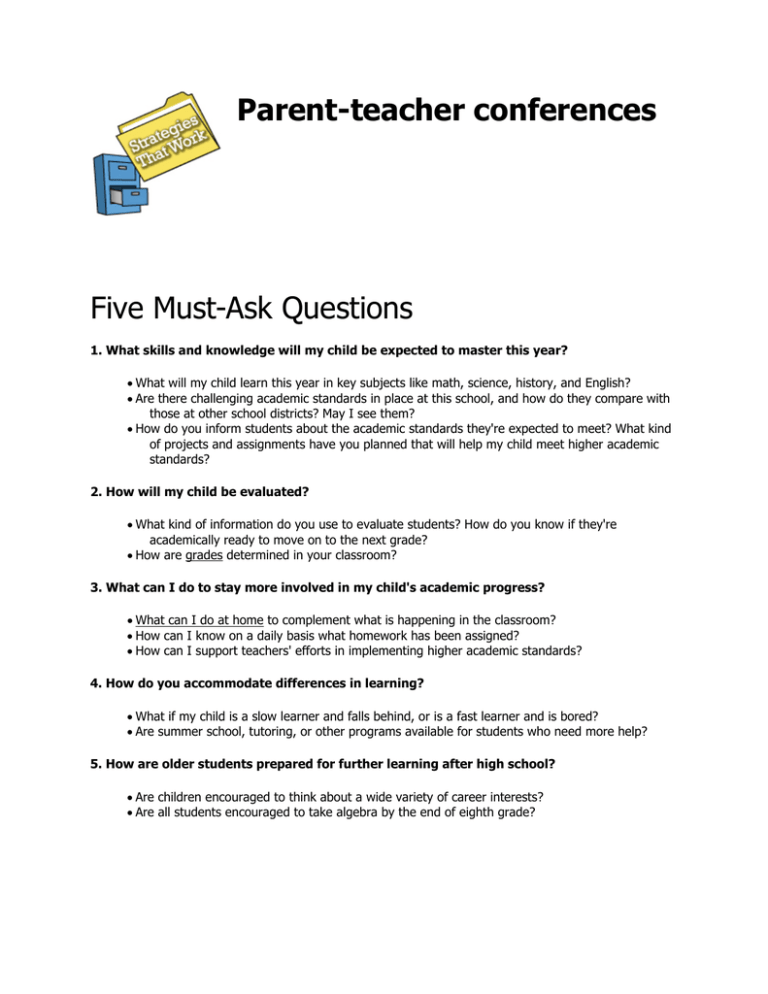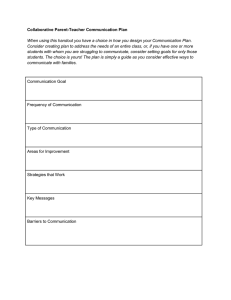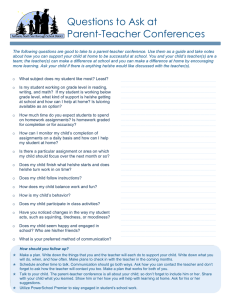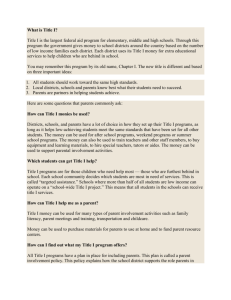Parent-teacher conferences Five Must
advertisement

Parent-teacher conferences Five Must-Ask Questions 1. What skills and knowledge will my child be expected to master this year? • What will my child learn this year in key subjects like math, science, history, and English? • Are there challenging academic standards in place at this school, and how do they compare with those at other school districts? May I see them? • How do you inform students about the academic standards they're expected to meet? What kind of projects and assignments have you planned that will help my child meet higher academic standards? 2. How will my child be evaluated? • What kind of information do you use to evaluate students? How do you know if they're academically ready to move on to the next grade? • How are grades determined in your classroom? 3. What can I do to stay more involved in my child's academic progress? • What can I do at home to complement what is happening in the classroom? • How can I know on a daily basis what homework has been assigned? • How can I support teachers' efforts in implementing higher academic standards? 4. How do you accommodate differences in learning? • What if my child is a slow learner and falls behind, or is a fast learner and is bored? • Are summer school, tutoring, or other programs available for students who need more help? 5. How are older students prepared for further learning after high school? • Are children encouraged to think about a wide variety of career interests? • Are all students encouraged to take algebra by the end of eighth grade? Ten Tips for a Successful Parent-Teacher Conference 1. Ask your child if there is anything that he would like you to discuss with the teacher. 2. Jot down everything that you want to talk about at the conference. 3. Arrive promptly or a few minutes early. 4. Begin with positive comments about the teacher or classroom. 5. Avoid lengthy discussions of topics that are not related to the purpose of the conference. 6. Be open-minded to suggestions from the teacher. 7. Keep your emotions under control. 8. Take notes about what has been discussed to share with your child. 9. Express appreciation for the conference. 10. Do not stay beyond your allotted time Questions for teacher Most teachers advise parents to write down the questions they want to ask at the conference. The following list covers most of the basics you will need to know about your child's development. 1. Is my child performing at grade level? 2. Does she/he pay attention in class? 3. What part of the curriculum does my child like most? Least? 4. Does my child participate in class discussions? 5. Does she/he attend to task? ("Attend to task" means to work on class assignments steadily without getting distracted or giving up.) 6. Have you noticed any special behavior problems? 7. How does my child get along with the other children in class? 8. Does my child express herself artistically? Does she enjoy drawing, painting, dance, or music? 9. Is there anything I can do to help my child do better? The grading system The exact meaning of terms like rubric, stanine, and standardized test may be confusing to parents and it would be helpful to make yourself familiar with some of the following terms and meanings before your parent-teacher conference. Grading systems differ from state to state and even from district to district, but most use variations of the following. Rubric. A rubric is a list of the skills needed to master a subject at a particular grade level. It is meant to clarify to both the child and the teacher exactly what is expected of the child by the end of the school year. Rubrics are usually broken down into four scoring levels: 1 = not proficient 2 = partially proficient 3 = proficient 4 = advanced Sometimes the rubric score is used as a grade, especially in early elementary years. For older children, rubrics are used as "scoring devices" that are a partial basis for letter grades. There is no nationwide standard for rubrics – sometimes the school district provides them and sometimes teachers devise their own. In public schools, the district's rubrics for each grade level are usually available from the teacher or the front office. Standardized Test (Stanford 9, Iowa, AIMS, TAAS, CAT, etc.). Standardized tests assess how well a student is learning. There is no national test; each state is free to select or devise its own. States also differ as to which grade levels must be tested. At the parent-teacher conference you can ask whether your child will be tested and if there is anything you should do to help him or her prepare. Percentile rank. Percentile rank is a way of comparing a child's scores to those of children in a "norm group" who took the standardized test when it was being developed. If your child has a percentile rank of 80, it means that 80 percent of the children in the norm group got a lower score than your child. Being in the eightieth percentile does not mean that your child answered 80 percent of the questions correctly. Entrance into G.A.T.E. (Gifted and Talented Education) programs is dependent on the percentile rank score. How to Get What You Want Absolute no-no's When parents walk into the classroom for a parent-teacher conference, teachers instantly scan them for clues about their attitude. Will they be friendly or hostile? Open-minded or rigid? Throughout the meeting, the parents' words and behavior paint a picture that will follow them throughout their child's career at the school. Don't enter the classroom clutching a stack of your child's papers. "When you see them with the child's papers in their hands, it means they're going to challenge you," notes Biederman. "Even if they only mean to come in and say, 'How lovely – he got a C,' that's not what's coming across when they walk in with those papers." If you must show the teacher your child's papers, keep them in your purse or otherwise concealed until you've established some rapport with her. Don't criticize other teachers, the principal, or the school. Your criticism will probably make her feel defensive or mistrustful of you. Don't criticize other parents or children. Keep your questions focused on your child. If you believe a particular student is giving your child a hard time – for instance, bullying or teasing him – broach the subject calmly and give specific examples and the names of witnesses, if you have any. There are two sides to every conflict, and the teacher may be able to fill you in on the side you are unaware of. Don't accuse the teacher of playing favorites or picking on your child. "We've heard the whole nine yards," says Ivy. "You don't like my child. You have it in for her. You have favorites. You like boys more than girls." Biederman recalls what happened when she told one mother that her daughter needed to raise her hand in class instead of blurting out the answers. The girl's mom retorted, "Well, I know something about you. Another parent told me, 'If Mrs. Biederman likes your child, you're golden, but if not, watch out!'" Outbursts such as this won't help your child. On the contrary, they will make teachers want to avoid you, which may mean avoiding or neglecting your child. Don't fib about your child. No child is perfect, and most parent-teacher conferences include at least a few minutes' worth of criticism about the child. Unfortunately, some parents can't handle bad news. Their response, perhaps out of fear, is to deny any knowledge of their child's shortcomings. "This is a very common complaint in the teacher's lounge," says Biederman. "A parent will look at you with wide-open eyes and say, 'This is the first time anyone's ever said anything!'" If your child has been in the school for more than one year, you can assume that prior to your meeting; his teacher has conferred with teachers from the previous years. If you feign ignorance about poor past performance or behavior, she will probably know you are lying. Your denial and lack of support may put a damper on her efforts to work with your child. For Your Child's Future, Control Yourself Your behavior at your Parent-Teacher conference will determine the relationship that you want to build with the teacher. Do want teachers to feel comfortable that you will support their efforts for teaching your child or will you push them away. A teacher at an exclusive girls' high school put it even more bluntly: "The admission interviews are to check out the parents, not the children. The staff wants to weed out the bullying parents who are going to cause everyone a lot of grief." Parent-teacher conferences are wonderful practice for those interviews.


